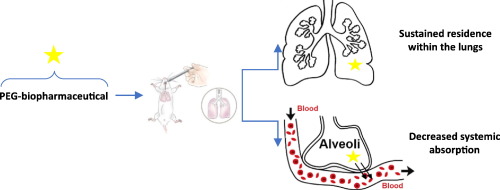More and more therapeutic proteins are developed for an administration by inhalation to treat respiratory diseases. PEGylation is an interesting approach for sustaining the residence time of these biopharmaceuticals in the lungs and thereby decrease the frequency of administration and the daily burden of inhalation therapies. Several PEGylated proteins have been delivered to the lungs in rodents and shown to be retained in the respiratory tract for longer periods than unconjugated counterparts. Mechanisms involved in their pulmonary retention might include increased molecular size, mucoadhesion, enhanced proteolytic resistance and escape from the uptake by alveolar macrophages. Pulmonary delivery of PEGylated peptides and proteins is also interesting as a non-invasive route of administration of long-acting biopharmaceuticals to the bloodstream. However, PEGylation decreases the systemic absorption of the compounds, especially when the PEG size is large. This review presents the recent work carried out on the pulmonary delivery of PEGylated biopharmaceuticals, the factors affecting residence time in the lungs and systemic absorption as well as the safety of the approach in preclinical studies.
- Home
- Blog
- News
- Basics
- Sources
- Agencies, Regulatory & Organisations
- CERSI Excipients Browser
- Excipient Report
- Excipient DMF List
- EXCiPACT Certified Companies
- Excipient Documentation
- Excipient EINECS Numbers
- Excipient E-Numbers
- FDA Inactive Ingredient List
- FDA GRAS Substances (SCOGS) Database
- IPEC Americas
- USP - U.S. Pharmacopeia
- Definitions
- Whitepapers / Publications
- Supplier
- Services
- Media
- Events
- 1st pharmaexcipients Poster Award
- Event Calendar
- Events featured by pharma-excipients
- 4th Annual Formulation & Drug Delivery Congress
- DDF Summit
- ExcipientFest Americas
- ExcipientFest Asia
- Global CompliancePanel
- International Conference and Exhibition on Pharmaceutics & Novel Drug Delivery Systems
- Formulation & Drug Delivery USA Congress
- Laboratory Medicine 2018
- Making Pharmaceuticals Europe
- Making Pharmaceuticals Exhibition
- Pharma Integrates
- PharmaExcipients China @CPhI China
- TTC Technology Training Center
- Jobs
- Online Sourcing
- Contact


Write a comment
cheap essay writing service (Saturday, 16 December 2017 10:26)
I'm very happy to uncover this page. I want to to thank you for your time just for this wonderful read!! I definitely liked every little bit of it and i also have you saved to fav to see new information in your website. This is very nice post. I appreciate your effort in this post. Thank you for sharing.